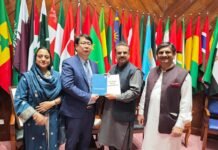Poland’s rich history and enduring spirit are notably encapsulated in its annual celebration of Independence Day on November 11th.
This significant occasion holds deep meaning for the Polish people, symbolizing the nation’s triumph over 123 years of partition and foreign dominance.
International recognition and warm wishes from countries like Turkey, Kazakhstan, Pakistan, Serbia, and Lithuania underscore the global importance of Poland’s Independence Day.
The Ministry of Foreign Affairs of Pakistan, for instance, extends heartfelt congratulations to Poland on this occasion, fostering diplomatic ties and shared celebrations.
The roots of Poland’s Independence Day stretch back to the late 18th century when the Polish-Lithuanian Commonwealth faced division and suppression. Despite decades of adversity, the unwavering Polish spirit prevailed, finding expression in uprisings and cultural preservation.
The turning point came on November 11, 1918, marking the end of World War I and the restoration of Poland’s independence under the leadership of national hero Józef Piłsudski.
The annual celebrations in Poland reflect the resilience and unity of its people. Solemn ceremonies, flag-raising events, patriotic parades, and cultural activities fill the day, fostering a sense of community and honoring shared history.
The iconic march in Warsaw, drawing participants from diverse backgrounds, symbolizes the nation’s commitment to freedom and democracy.
Poland’s Independence Day not only commemorates historical victories but also serves as a poignant reminder of sacrifices made for sovereignty.
In the face of modern challenges, it remains a beacon of hope and determination for the Polish people to shape their destiny.
Also read: Zambia Independence Day 2023
Beyond its historical significance, Poland boasts a thousand-year history and diverse landscapes, including the Carpathian Mountains and the Baltic Sea coastline.
Its cultural heritage, despite wartime destruction, endures, with 14 UNESCO World Heritage sites standing testament to the nation’s resilience.
The Polish language, a West Slavic language with various dialects, reflects ancient tribal divisions and foreign influences.
Culinary traditions, such as shared family meals and the ‘drugie śniadanie’ (second breakfast), emphasize the importance of family and food in Polish culture.
The continuation of the tradition of Sunday lunches further underscores the enduring cultural practices in Poland.
Iffat Masood is Contributor and Content writer on THE DIPLOMATIC INSIGHT, and also Ambassador from IAMCR. She is perusing her PhD. from UAB Barcelona, Spain in Audio-Video Communications and Advertising.








